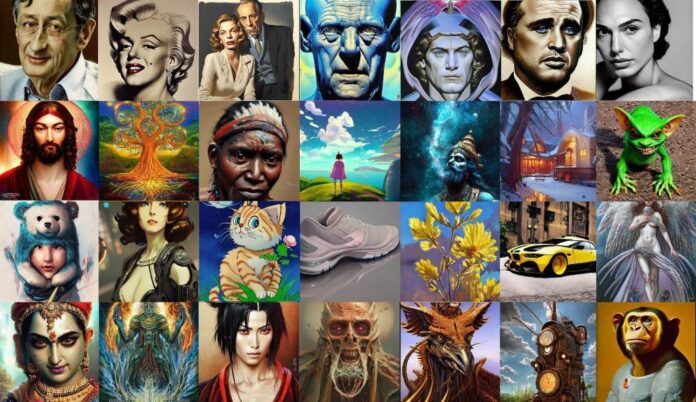A group of artists has filed a class-action complaint against the companies behind a trio of A.I. art generators, saying the services violated copyright and unfair competition laws.
On January 13, illustrators Sarah Andersen, Kelly McKernan, and Karla Ortiz filed suit in the Northern District of California against Midjourney Inc, DeviantArt Inc, which is behind DreamUp, and Stability A.I. Ltd, the company that launched Stable Diffusion. They term these text-to-image platforms “21st-century collage tools that violate the rights of millions of artists.”
Chiefly, the artists’ complaint states that A.I. generators have used their artworks without consent or compensation to build the training sets that inform the platforms’ algorithms. In particular, these services rely on the LAION-Aesthetics dataset, created by a German company and commissioned by Stability A.I.
The lawsuit cites a study that found that 47 percent of the LAION-Aesthetics dataset is made up of images from stock photo sites such as Shutterstock and Getty Images, shopping sites including Pinterest, and websites hosting user-generated content such as Flickr and Tumblr. An estimated one of out every 50 images in the dataset (or about 3.3 million images) had been sourced from DeviantArt, according to the complaint.
“Defendants are using copies of the training images,” it reads, “to generate digital images and other output that are derived exclusively from the Training Images, and that add nothing new.” In turn, these generated images, “will substantially negatively impact the market for the work of plaintiffs and the class.” Both Andersen and McKernan say their art has been used in LAION datasets.

Image created with A.I. using DreamUp. Photo courtesy of DeviantArt DreamUp
Additionally, the class action asserts that A.I. generators have allowed art to be generated “in the style” of particular artists, thus “siphoning commissions from the artists themselves.” Because of this “unlawful appropriation,” the plaintiffs claim that the value of their art has been devalued and diluted amid a flood of similar-looking A.I.-generated images. (Andersen recently penned an op-ed in the, writing that generators have effectively imitated the style of her webcomic.)
“Defendants specifically and knowingly used Plaintiffs’ names because these names were uniquely related to specific artistic styles, and Defendants generated valuable business from their ability to sell artworks ‘in the style’ that plaintiffs popularized,” the suit emphasizes. “Thus, the use of plaintiffs’ names contributed value to defendants’ platform and services.”
The class is requesting the district court award damages pursuant to the stated violations, as well as permanent injunctive relief that includes “making changes” to the A.I. image generators.
The Joseph Saveri Law Firm, which represents the plaintiffs, did not immediately respond to multiple requests for comment.
A spokesperson for Stability A.I. told Artnet News, “we take these matters seriously. Anyone that believes that this isn’t fair use does not understand the technology and misunderstands the law.” Midjourney and DeviantArt did not respond to requests for comment.

Photo courtesy Stability AI Github.
The point on fair use has also been surfaced by Stable Diffusion Frivolous, a website purportedly created by “tech enthusiasts uninvolved in the case, and not lawyers” in support of the defendants in the lawsuit.
The site argues that “there are limits to the rights of creators, and the world is better for the existence of fair use,” a doctrine in U.S. copyright law that allows excerpts of copyrighted material to be used for nonprofit educational purposes, without permission from or payment toward the copyright holder.
Stable Diffusion Frivolous further takes issue with the complaint’s characterization of A.I. generators as “collage tools,” stating that these models work on associations or “data distributions” rather than any form of copying, pasting, or blending. A.I.-generated images, it added, could be considered “transformative” enough to not violate copyright laws.
The group deems the plaintiffs “anti-A.I. artists [that fear] being replaced by artists who use A.I. tools in their workflows,” concluding that “those who refuse to acknowledge advancements in technology and instead fight against them are like whittlers mad at power tools.”
Stable Diffusion, along with other text-to-image tools including Midjourney and Lensa, have rocketed in use over the past year, with A.I.-generated images swiftly populating social media, art-sharing sites, and at least one art competition. While platforms such as DeviantArt’s DreamUp have attempted to build in protections for creators rights, artists have emphasized that infringements begin with the training datasets, into which copyrighted images have been scraped.
Most recently, Getty Images, which says it has found more than 15,000 photos from its library in the Stable Diffusion dataset, brought a separate lawsuit against Stability A.I., claiming copyright violations. In an interview with , Getty Images CEO Craig Peters said the stock image giant is not seeking financial compensation or to halt the development of generative A.I., but legal “clarity” as to the rights of creators and entities.

























